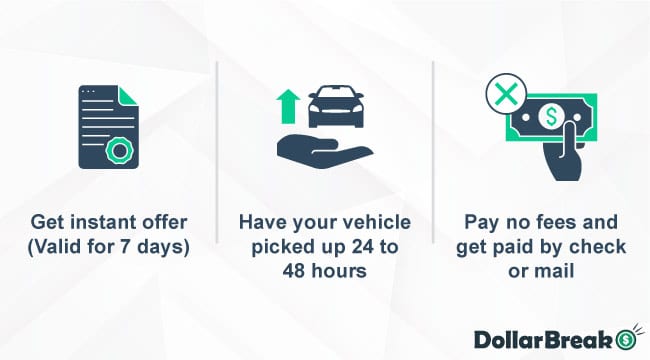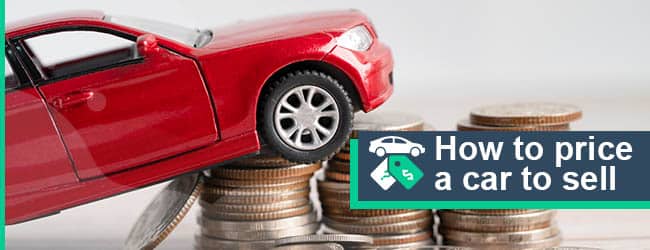Quick Answer:
To determine your car’s worth, three principal approaches are recommended: utilizing car valuation websites, checking market prices via online marketplaces, and receiving quotes from car-buying websites.
The value of the car is influenced by multiple factors, including its make and model, trim level, mileage, age, condition, market demand, warranty, service records and the way of selling.
Key Takeaways:
- Factors Affecting Value: Know the key factors influencing your car’s value, such as make, model, age, condition, and market demand.
- Enhancing Car Value: Small repairs and improvements can potentially increase the car’s value.
- Choosing the Selling Method: Decide the selling method based on your time constraints and desired return. Online platforms offer quick sales, while private sales might yield higher returns but take longer.
Best for Older & Damaged Cars

Buys used, damaged or junk cars
Free tow and no hidden fees
Pays by ACH trasfer or check
Top Pick for Junk Cars

Free, no-obligation cash offers
Offers free paperwork service
Pays on the spot upon pick up
How to Price a Car to Sell:
1. Car Valuation Websites
Car valuation websites gather information from multiple channels like dealership sales, private sales, auction outcomes, and wholesale costs to gauge a car’s market worth.
To receive this estimate, you should input details about your car, including its brand, model, production year, mileage, condition, and any unique features it might have.
The valuation system then accounts for the car’s depreciation, local market dynamics, and prevailing market tendencies to offer an estimated value for trade-in, private sale, and dealership retail.
Kelley Blue Book
Kelley Blue Book offers a free car valuation tool, where you can determine your vehicle’s worth by inputting its VIN, and license plate number or manually providing car details.
The values from Kelley Blue Book are tailored to local conditions in more than 100 geographic areas. They are refreshed weekly, ensuring that consumers receive the latest information on used car prices.
Edmunds
Edmunds’ car value calculator derives its estimates from real dealer sales data, car depreciation figures, and consumer insights.
The tool calculates the average price paid for new or used vehicles in your region, providing you with a benchmark for fair price negotiations.
However, this tool assesses vehicles from 1990 onwards, making it unsuitable for appraising classic cars.
J.D Power
J.D. Power conducts a thorough analysis of over 20 million transactions each year, employing advanced methodologies and data science techniques.
By utilizing the J.D. Power pricing tool, you can obtain estimated dealer and trade-in values, along with the number of transactions examined and the date of the last database update.
2. Online Car Listings
An alternative method to determine a car’s price is to explore car-selling websites and look for listings of cars similar to yours.
You can compare these vehicles based on their make, model, year, mileage, condition, and special features.
Observing the duration for which a car has been listed can also provide insights: a long listing duration may indicate a price that’s too high, while a quick sale could indicate a price that was set too low.
CarGurus
CarGurus ranks as one of the top car-selling websites in the USA. It offers thousands of listings, which you can filter based on your location and specific car details like trim, color, mileage, and year.
Additionally, you have the option to subscribe for notifications about new listings that match your particular criteria.
CarGurus also provides statistics on a used car pricing index, which is useful for those interested in keeping up with market trends.
Autotrader
AutoTrader is another well-known platform for selling cars. Its filters allow you to find comparable car listings based on various features like trim, condition, fuel type, interior and exterior colors, mileage, and more.
It’s also important to choose a seller type: dealer or private seller. Opting for Private Seller listings can provide a more accurate reflection of the market price.
3. Online Car Buying Companies
Online car-buying companies are the best way to sell your car fast. By applying for a cash offer, you will get insight into how much you could get if you decide to sell fast and compare it to selling privately, which is worth the effort.
Peddle
Peddle purchases a wide range of cars, encompassing used, damaged, or junk vehicles, even those with engine or transmission problems, missing parts, and other issues.
With Peddle’s online cash offer tool, you can quickly discover your car’s value in just minutes.
To receive an offer, you’ll need to input details about your car, including its make, model, year, and mileage, and answer some simple questions regarding the car’s condition.
Wheelzy
Wheelzy is a reputable company offering instant online cash offers for vehicles. To determine your car’s value, simply complete their online form, providing details like your car’s make, model, zip code, and phone number.
Within two minutes or less, a Wheelzy representative will reach out to you with an offer.
CarBrain

CarBrain offers a service to sell your car online. To discover your vehicle’s value, you need to fill out an online form specifying details like the car’s make and model, mileage, condition, title status, and location.
The valuation of your car is based on the information you provide and the existing market demand for similar vehicles.
Factors Influencing Car Pricing
When it comes to car pricing, several key factors play a crucial role in determining the cost.
Most important are: make and model, trim level, mileage, age, condition, market demand, warranty, service records and way of selling.
1. Make and Model
The make and model of a car significantly influence its price in the used car market, mainly due to the following factors:
- Brand Reputation and Reliability: Certain brands are known for their reliability, durability, and performance, which can maintain higher resale values. For example, brands like Toyota and Honda are often valued higher in the used market due to their reputation for reliability.
- Depreciation Rate: Different makes and models depreciate at different rates. Luxury cars, for instance, tend to depreciate faster than economy cars.
- Cost of Ownership and Maintenance: Cars that are cheaper to maintain and run (like those with good fuel efficiency and low maintenance costs) often have better resale values.
- Market Trends and Economic Factors: For example, SUVs and trucks might be more in demand in certain markets or seasons, affecting their resale value positively.
- Rarity and Exclusivity: Limited edition models or cars that are no longer in production can sometimes have higher resale values, especially if there’s a demand among collectors or enthusiasts.
2. Trim Level
The trim level significantly affects a car’s resale value, as higher trims typically feature additional and advanced specifications, boosting their desirability and price.
The most popular trim features that typically contribute to high resale value in used cars include:
- Advanced Safety Features: Features like adaptive cruise control, blind-spot monitoring, lane departure warning, and automatic emergency braking.
- Technology and Infotainment: Modern infotainment systems with touchscreen displays, smartphone integration (like Apple CarPlay and Android Auto), GPS navigation, and premium sound systems.
- Luxury Interiors: High-quality materials such as leather seats, heated and ventilated seating, and a sunroof/moonroof.
- Performance Upgrades: Engines with higher horsepower, better suspension systems, and other performance-related improvements.
- Fuel Efficiency and Hybrid/Electric Technology: With rising fuel costs and environmental concerns, cars with high fuel efficiency or hybrid/electric capabilities.
- Exterior Enhancements: Alloy wheels, LED headlights, and other aesthetic enhancements.
- All-Wheel Drive (AWD): Especially in regions with harsh weather conditions.
- Driver Assistance Packages: Packages that include multiple assistance features like parking assist, 360-degree camera systems, and traffic sign recognition.
3. Mileage
Mileage plays a crucial role in determining a used car’s value. Cars with lower mileage generally have higher values due to less wear and tear and a longer expected lifespan compared to high-mileage vehicles.
Up to 30,000 Miles – Such cars are typically around 2 years old and in good shape. Their resale value is high, though they’ve typically experienced an average depreciation of about 35%.
30,000 – 60,000 Miles – Cars in this mileage range are usually under 3 years old, considered relatively new and in good condition. Their resale value remains high, with a slower rate of depreciation.
60,000 – 100,000 Miles – These vehicles are often 5-7 years old and seen as being in average condition. Their value has generally dropped by about 60% on average, but they can still be attractive to used car buyers.
200,000+ Miles – Cars exceeding 200,000 miles are categorized as high-mileage. At over 14 years old, these vehicles have typically lost at least 90% of their original value. Their market value is often significantly lower than the combined costs of necessary repairs and maintenance.
4. Age
The age of a car is a key factor in determining its price in the used car market, mainly due to depreciation, which is most rapid in the first few years. Older cars usually have higher mileage and more wear and tear, affecting their value.
However, the overall condition, maintenance history, and specific make and model can significantly influence a car’s resale value.
Newer models with the latest technology and features are generally more appealing, but some older cars may hold value better due to their historical or collector appeal.
5. Condition
The resale value of a car is significantly influenced by its condition. Cars in better condition typically command higher prices. Here’s how various aspects of a car’s condition affect its value:
Exterior Condition: cars with scratches, dents, or rust generally sell for less than those with a pristine exterior. Buyers are often drawn to cars that appear well-cared for and visually appealing.
Interior Condition: Cars with clean, well-maintained interiors, intact upholstery, and fully functional electronics are likely to sell for more.
Mechanical Condition: Cars with smooth-running engines, efficient transmissions, and reliable brakes are valued higher than those with mechanical issues. Cars needing costly repairs are less appealing to buyers.
Maintenance History: cars with documented, regular maintenance and servicing are generally more valuable, as they are likely in better mechanical condition and have a longer expected lifespan.
Accident History: cars with a history of accidents, even minor ones, usually sell for less than those with a clean history. This is due to potential hidden damage and future problems that accidents might cause.
6. Market Demand
Market demand plays a crucial role in determining car prices, operating through several key mechanisms:
- Supply and Demand Dynamics: when a particular model or type of car is in high demand but in limited supply, its price tends to increase. Conversely, if a car is readily available but has little demand, its price may decrease to attract buyers.
- Trends and Preferences: for instance, the growing interest in environmentally friendly vehicles has led to increased demand and higher prices for electric and hybrid cars.
- Economic Conditions: in a robust economy, people may be more willing to invest in higher-priced vehicles, whereas, in a downturn, there might be a shift towards more economical models.
- Geographical Factors: for example, SUVs may be more in demand in areas with harsher climates or rugged terrain, which can drive up their prices in those markets.
- Fuel Prices: rising fuel costs might increase demand for fuel-efficient cars, thereby raising their prices.
- Innovation and Technology: advances in automotive technology, such as autonomous driving features or connectivity, usually create demand for cars equipped with these innovations.
7. Warranty
A car warranty can influence its price in two primary ways:
- Resale Value: Cars with a valid warranty usually command higher prices than those without. The warranty assures buyers they won’t have to cover major repair costs, enhancing the vehicle’s appeal.
- Initial Cost: While opting for an extended warranty might raise a car’s initial purchase price, this can be balanced by future repair cost savings.
The extent to which a warranty affects a car’s price depends on the warranty type and its duration.
For example, a comprehensive warranty covering all major parts will significantly boost a car’s value more than a powertrain warranty, which is limited to the engine, transmission, and drivetrain.
Longer warranties tend to increase a car’s value more than shorter ones.
8. Service Records
Maintaining service records can significantly boost a car’s resale value. Cars with complete service histories are more attractive to buyers, offering proof of the vehicle’s good condition and adherence to maintenance schedules.
These records reassure buyers about the car’s care, lessening concerns about unexpected issues and ensuring its reliability for the long term.
9. Way of selling
There are several methods to sell a used car, each affecting the car’s selling price differently:
- Selling privately: may yield the highest profit but requires significant time and effort. Setting a competitive price is crucial, and you’ll need to negotiate with buyers, some of whom may offer lower than desired prices.
- Selling online: quickest and most convenient method to sell a car. The process can be completed in just a few days but typically results in a lower selling price compared to a private sale.
- Selling to a dealership: a fast and straightforward method, but typically results in a lower selling price because dealerships buy at a price that allows them to profit upon resale.
- Consignment shop: If you prefer not to manage the sale yourself, a consignment shop can handle it for you. They take care of the sales process but will take a commission from the sale.
- Trading in: When buying a new car, trading in your old one is convenient but often results in a lower valuation than selling it directly.

Types of Car Values
A car’s value can vary based on several factors, including how and where it’s being sold and who is buying it. Different types of car values are commonly discussed when researching a car’s worth:
- Trade-in value: This is typically the lowest amount a dealership will offer for your car, often called the wholesale price. It’s the expected amount if you trade in your car at a dealership while purchasing another one. However, the tax savings factor in most states makes the trade offer more appealing.
- Private party resale value: This is the amount you can expect when selling your car to an individual rather than a dealer. It’s usually higher than the trade-in value but lower than the retail value. This would be your expected earnings if you sell your car post-negotiation.
- Dealer retail value: This is the price a dealer might list for your car if it were part of their inventory. However, when selling to a dealer, expect to get a lower price for your car will, as they need to account for their profit margin.
- Certified pre-owned value: Some used cars are sold with thorough inspections and bumper-to-bumper warranties. These certified pre-owned vehicles often have a higher price, as indicated by various pricing guides.
It’s important to note that these values are estimates. The actual price of a car isn’t confirmed until it’s presented as a formal offer.
How Long Does it Take to Sell a Car?
On average, selling a used car to a private buyer takes about 52 days. This includes various steps such as cleaning the car, taking high-quality photos, setting the car’s price, listing it online, responding to inquiries, arranging test drives, and handling the paperwork.
Alternatively, selling a car to a local dealership is a quicker option, usually taking about 4 to 5 days, though it requires visiting multiple dealerships to find suitable buyers.
The fastest way to sell a car is to sell to online car-buying websites such as Peddle, Wheelzy or Carbrain, where the process takes up to 48 hours.
What Paperwork is Required to Sell a Car?
The list of required paperwork to sell a car varies by state.
However, a Certificate of Title is universally required in the U.S. Depending on where you live, you may also need to provide a bill of sale, complete a VIN inspection, and have a current emissions test.
To help establish your vehicle’s value and assure potential buyers about its maintenance history, it’s advisable to conduct a VIN check, compile service records, and provide the owner’s manual.










